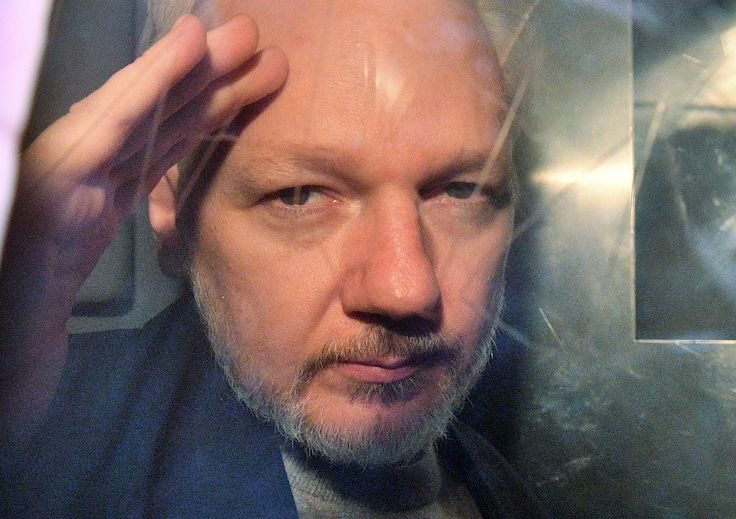WikiLeaks founder Julian Assange and his allies are fretting that the turmoil surrounding the transfer of power in Washington, D.C., is distracting from his appeal for a presidential pardon—and they are reaching out to perceived allies in the media to draw attention to his case.
At the request of Assange's partner, Stella Moris, WikiLeaks has appealed to media outlets across the political spectrum for ideas on how to best press President Donald Trump to grant him a pardon.
"Julian Assange's partner [Stella Moris] asked us to contact you," WikiLeaks wrote in a Thursday message to the Washington Free Beacon. "She was hoping that you may have ideas or contacts that could help convince Trump to pardon Assange."
Assange was indicted in 2010 on 17 charges of espionage for publishing classified U.S. military documents, but British courts ruled on Jan. 4 that he cannot be extradited to the United States to face the charges. The Free Beacon opposes pardons for espionage by enemies of the U.S. government.
Moris on Friday said she was working to gin up a broader campaign. "I asked WikiLeaks to reach out to some of its most influential followers for me, people from across the political spectrum," Moris told the Free Beacon. "I want to keep Julian's pardon from being drowned out by everything else that is going on."
Included in Moris's correspondence were an Amnesty International video declaring the organization's support for Assange; a recent New York Times op-ed by journalist Laura Poitras bemoaning her own prosecution for violating the Espionage Act; and a video from Moris presenting "the case for why Assange should be pardoned from a Republican perspective." The video includes clips of Fox News figures Tucker Carlson and Andrew Napolitano, Trump lawyer Rudy Giuliani, former Rep. Ron Paul (R., Texas), and former Alaska governor Sarah Palin (R.).
Trump praised WikiLeaks often during his 2016 campaign for president as the group Assange founded released internal communications of the Democratic National Committee and his opponent Hillary Clinton's top campaign officials. "WikiLeaks, I love Wikileaks," Trump said at one campaign rally.
The praise dissipated once Trump entered office. In the opening months of his presidency, while Assange was being held at the Ecuadorian embassy in London, Trump said it was "okay with" him if Assange were arrested. And, in 2019, Trump said he knew nothing about WikiLeaks.
"I know nothing about WikiLeaks. It's not my thing," Trump said in April 2019. "I know there is something having to do with Julian Assange."
Assange's supporters had been optimistic about the prospects of a presidential pardon. There was a surge in media speculation that Trump would issue a wave of pardons during his final days in office, but that was all derailed last Wednesday when supporters of the president stormed the U.S. Capitol to challenge the results of the 2020 presidential election.
Trump's tumultuous final days have instead been overshadowed by a second impeachment and government efforts to ensure that next week's transfer of power to President-elect Joe Biden remains peaceful.
Assange's charges in the United States stem from his 2010 hack and release of classified U.S. military documents, the largest unauthorized release of classified materials in U.S. history. Ecuador revoked his asylum status in 2019, which led to his arrest by British authorities.
At the time of Assange's initial crimes in 2010, Trump called the release of classified information "disgraceful" and suggested that Assange should face the death penalty.
Chelsea Manning, the military intelligence officer who provided Assange with the documents, had her 35-year sentence commuted in the final days of President Barack Obama's presidency. Manning has since been thrown back in prison for refusing to testify in the government's case against Assange.
